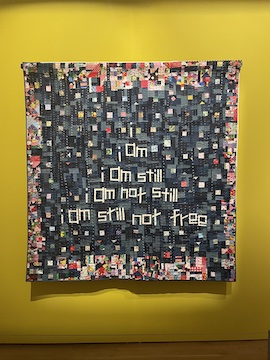Chawne Kimber facts for kids
Quick facts for kids
Chawne Kimber
|
|
|---|---|
| Born | 1971 (age 54–55) Frankfort, Kentucky
|
| Nationality | American |
| Alma mater | University of Florida |
| Title | Dean of the College |
| Scientific career | |
| Institutions | Washington and Lee University Lafayette College Wesleyan University |
| Doctoral advisor | Jorge Martinez |
Chawne Monique Kimber (pronounced SHAWN; born in 1971) is an African-American mathematician and quilter. She is famous for using her quilts to express her ideas about important social topics. She has been a professor and a leader at several universities. In 2025, she became the vice president for academic affairs and dean of faculty at Pitzer College.
Her Journey in Math
Chawne Kimber grew up in Frankfort, Kentucky. Her family were cotton farmers and quilters in Alabama. She always loved math. She started college at the University of Florida studying engineering. But she soon switched to mathematics because she found it more exciting.
She earned her master's degree in 1995 from the University of North Carolina. Then, she went back to the University of Florida for her Ph.D., which she finished in 1999. Her Ph.D. project was about "Prime Ideals in Rings of Continuous Functions." It connected different areas of math.
After teaching at Wesleyan University, she joined Lafayette College as a professor. In her math classes, she liked to include ideas about social justice. This means teaching about fairness and equality. She became a Professor and later the head of the Math Department.
In 2008, she helped start a special summer program at Lafayette. It was called the Summer Program to Advance Leadership in STEM. STEM stands for Science, Technology, Engineering, and Math. This program helped new college students who were leaders from groups often not seen enough in STEM fields. They took college-level writing and math classes.
In 2018, Chawne Kimber received a special scholarship. It helped her attend an institute for leaders in higher education. While she was the head of the Math Department, she worked to make sure everyone felt welcome. She helped people understand that math can open doors to many other fields.
In May 2021, Washington and Lee University announced that Chawne Kimber would become their Dean of the College. She started this role on July 1, 2021. As Dean, she was in charge of many different departments and programs. She helped guide the academic side of the university.
Her Amazing Quilts

Chawne Kimber grew up seeing her great-grandmother's quilts. Her father thought these quilts were very important. Chawne started quilting in 2005. She became even more interested in 2007 after her father passed away.
Her quilts are inspired by her great-grandmother's work. Her great-grandmother used a patchwork style similar to the famous Gee's Bend quilts. Chawne sees her own work as a modern version of that style.
In 2008, she began making quilts with strong messages about social issues. She also started writing about them online. Her work is part of the "modern Quilting" movement. This movement uses geometric designs and thought-provoking content. Her quilts talk about important social issues.
Chawne Kimber's quilts are often shown at quilting events and museum exhibits. The Paul Mellon Arts Center displayed her works in 2018. One of her quilts won first place at a big quilting show in 2016. This quilt was inspired by the death of Eric Garner. Her work, still not, was bought by the Smithsonian American Art Museum. This quilt used fabrics from the middle of the last century. The museum explained that Chawne's choice of old cloth and unique patterns came from her family history. Her ancestors in Alabama grew cotton. Her great-grandmother, Mamo, and other relatives expressed themselves through quilting. Chawne continues their tradition.
Elizabeth Landau wrote in The Washington Post in 2020 that Chawne Kimber tries to keep her math and quilting separate. Some of her quilts are very free and don't follow strict patterns. They are like jazz music made with fabric and stitches. But both her math and quilting work share a common goal. They both challenge unfairness in society. Chawne Kimber's quilts are important for today and for the future.
 | Sharif Bey |
 | Hale Woodruff |
 | Richmond Barthé |
 | Purvis Young |

